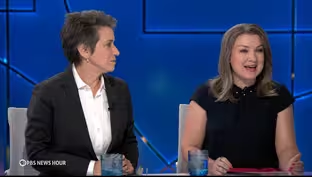
What new student loan rules mean for borrowers
Clip: 7/21/2025 | 6m 16sVideo has Closed Captions
What the new student loan rules mean for current and future borrowers
President Trump’s new tax and spending law brings sweeping changes to the federal student loan system, affecting both current and future borrowers. Nearly half a million borrowers could see their payments spike after the Department of Education scrapped most existing repayment plans. For a breakdown of what it all means, Geoff Bennett spoke with NPR education correspondent Cory Turner.
Problems playing video? | Closed Captioning Feedback
Problems playing video? | Closed Captioning Feedback
Major corporate funding for the PBS News Hour is provided by BDO, BNSF, Consumer Cellular, American Cruise Lines, and Raymond James. Funding for the PBS NewsHour Weekend is provided by...

What new student loan rules mean for borrowers
Clip: 7/21/2025 | 6m 16sVideo has Closed Captions
President Trump’s new tax and spending law brings sweeping changes to the federal student loan system, affecting both current and future borrowers. Nearly half a million borrowers could see their payments spike after the Department of Education scrapped most existing repayment plans. For a breakdown of what it all means, Geoff Bennett spoke with NPR education correspondent Cory Turner.
Problems playing video? | Closed Captioning Feedback
How to Watch PBS News Hour
PBS News Hour is available to stream on pbs.org and the free PBS App, available on iPhone, Apple TV, Android TV, Android smartphones, Amazon Fire TV, Amazon Fire Tablet, Roku, Samsung Smart TV, and Vizio.
Providing Support for PBS.org
Learn Moreabout PBS online sponsorshipGEOFF BENNETT: President Trump's new tax and spending law brings sweeping changes to the federal student loan system, affecting both current and future borrowers.
Nearly half-a-million borrowers could see their payments spike after the Department of Education scrapped most existing repayment plans.
The law also imposes new lifetime borrowing caps, $100,000 for graduate students, $200,000 for those pursuing professional degrees like law or medicine, and $65,000 per child for parent borrowers.
For a breakdown of what this all means, we're joined now by NPR education correspondent Cory Turner.
Cory, thanks again for being with us.
So as borrowers start receiving these repayment notices, what can they expect?
What options are available to them?
CORY TURNER, NPR: New borrowers who take out loans after July 1, 2026, the good news for them is, they won't have very many options.
I guess that's a good thing.
The Congress recently decided to whittle down options for new borrowers from seven current repayment plans down to two.
Those include a standard repayment plan with fixed monthly payments and then a brand-new income-based repayment plan, which obviously tailors what you owe each month to your income.
Now, legacy borrowers are just a lot more complicated.
They're going to still have access to some currently existing plans, at least for a while.
I think what we're seeing right now with the department, though, is, because the Trump administration has cut the staff at the department in half, including cutting roughly half of the Office of Federal Student Aid, which is responsible for managing the student loan program, I think what you're seeing are just backlogs.
GEOFF BENNETT: And beyond this initial confusion, based on your reporting, what are some of the other big concerns about this overhaul?
CORY TURNER: We're at a really interesting moment here where Congress has decided to create these new -- these two new plans for future borrowers.
But those plans aren't ready, and they won't be ready for roughly a year.
And it just so happens that right now we have, what, 7.7 million borrowers in a really tricky spot right now, because they're enrolled in the Biden era repayment plan known as SAVE, Saving on a Valuable Education.
They're in legal limbo because of lawsuits that were filed arguing that the program is too generous.
So they can't actually make -- they're not required to make payments right now, but we know the Ed Department just announced that interest is going to start accruing on their loans August 1.
This new income-based repayment plan won't be available to them yet.
And so the options are pretty murky.
I would just mention one option they might not know about, they will have access to an older plan called IBR.
It stands for income-based repayment.
It's pretty straightforward.
It does offer loan forgiveness after 20 or 25 years, depending on how much loans are.
So that's one option among several.
GEOFF BENNETT: Let's talk about the new caps on graduate and professional school loans, $100,000, as we said, for graduate students.
$200,000 for law or medical school students.
What more should we know?
CORY TURNER: Yes, I think these are going to be some of the biggest, most surprising changes for borrowers.
And we should also say, Geoff, so nothing will have changed about borrowing limits for undergrads.
So that's going to be business as usual.
For grad students overall, for context, overall, they will be allowed to borrow $100,000.
That's replacing the old ceiling, which was around $138,000.
So it's a pretty big difference.
For Parent PLUS borrowers, they will be limited to $65,000 in total per child.
From what I have heard -- I have spoken with several researchers who have looked at how these programs have been used in the past.
And I think the majority of borrowers in each program previously have borrowed within these new limits, but it will affect a subgroup of borrowers who might be pushed to make some difficult choices between getting that degree at the school they want to go to and maybe trying to go somewhere else where it's cheaper.
GEOFF BENNETT: And could these caps, Cory, help rein in the cost of higher education?
That was certainly one of the arguments in support of it.
CORY TURNER: I think that is an open question, Geoff.
That is the million-dollar question, the trillion-dollar question,whether or not reining in some of this -- and, look, it was easily accessible money, especially for graduate programs.
Graduate students could essentially borrow up to the cost of their program.
And so what we did see in recent years were a lot of large schools, both for-profit, but also private nonprofit, charging really an arm and a leg for graduate degrees, where it just wasn't reasonable to expect that degree to pay off the amount of debt students were being asked to take out.
And the problem with that system in those cases is that it's essentially the federal government taxpayers who are bearing much of the risk.
So I think there is a lot of support, even bipartisan support, for reining in some of this graduate level spending.
The question is, will it really compel some of these schools, who you could argue were behaving irresponsibly, will it actually compel some of them to lower their prices and change their ways?
GEOFF BENNETT: NPR education correspondent Cory Turner.
Cory, thanks again.
CORY TURNER: You're welcome, Geoff.
After Roe, pro-life activists take aim at birth control
Video has Closed Captions
Clip: 7/21/2025 | 9m 35s | After fall of Roe, anti-abortion activists take aim at birth control (9m 35s)
Ann Patchett and Maureen Corrigan name summer's top books
Video has Closed Captions
Clip: 7/21/2025 | 8m 20s | Top books to read this summer, according to Ann Patchett and Maureen Corrigan (8m 20s)
Beto O'Rourke on Trump's congressional maps effort in Texas
Video has Closed Captions
Clip: 7/21/2025 | 8m 24s | O'Rourke says 'we have to fight back' as Trump pushes Texas to redraw congressional maps (8m 24s)
NATO promises Ukraine more weapons as Russia launches attack
Video has Closed Captions
Clip: 7/21/2025 | 4m 44s | NATO countries promise more weapons for Ukraine as Russia launches massive assault (4m 44s)
Tamara Keith and Amy Walter on interest in the Epstein case
Video has Closed Captions
Clip: 7/21/2025 | 8m | Tamara Keith and Amy Walter on the public response to Trump's handling of the Epstein case (8m)
Providing Support for PBS.org
Learn Moreabout PBS online sponsorshipSupport for PBS provided by:
Major corporate funding for the PBS News Hour is provided by BDO, BNSF, Consumer Cellular, American Cruise Lines, and Raymond James. Funding for the PBS NewsHour Weekend is provided by...
















